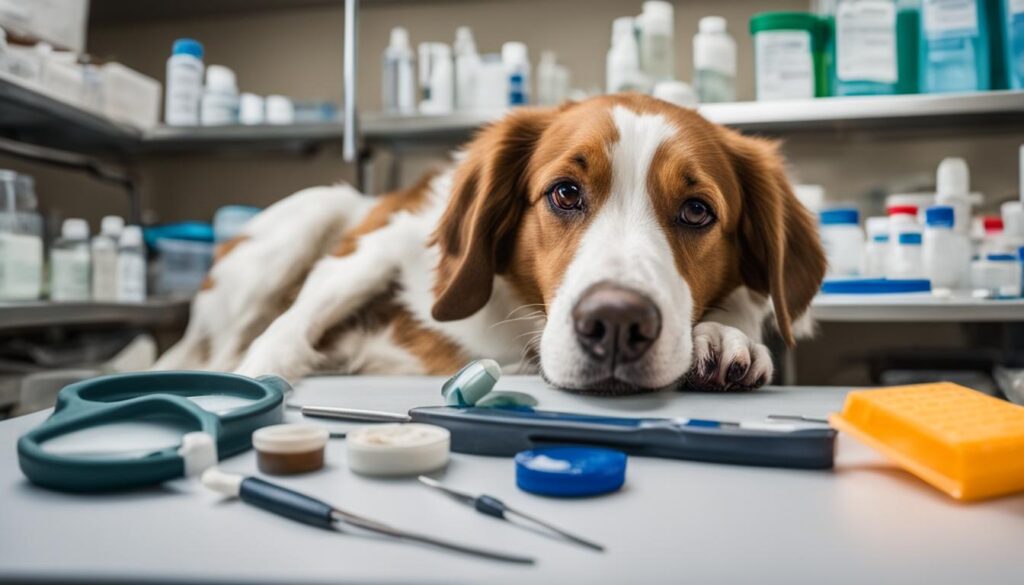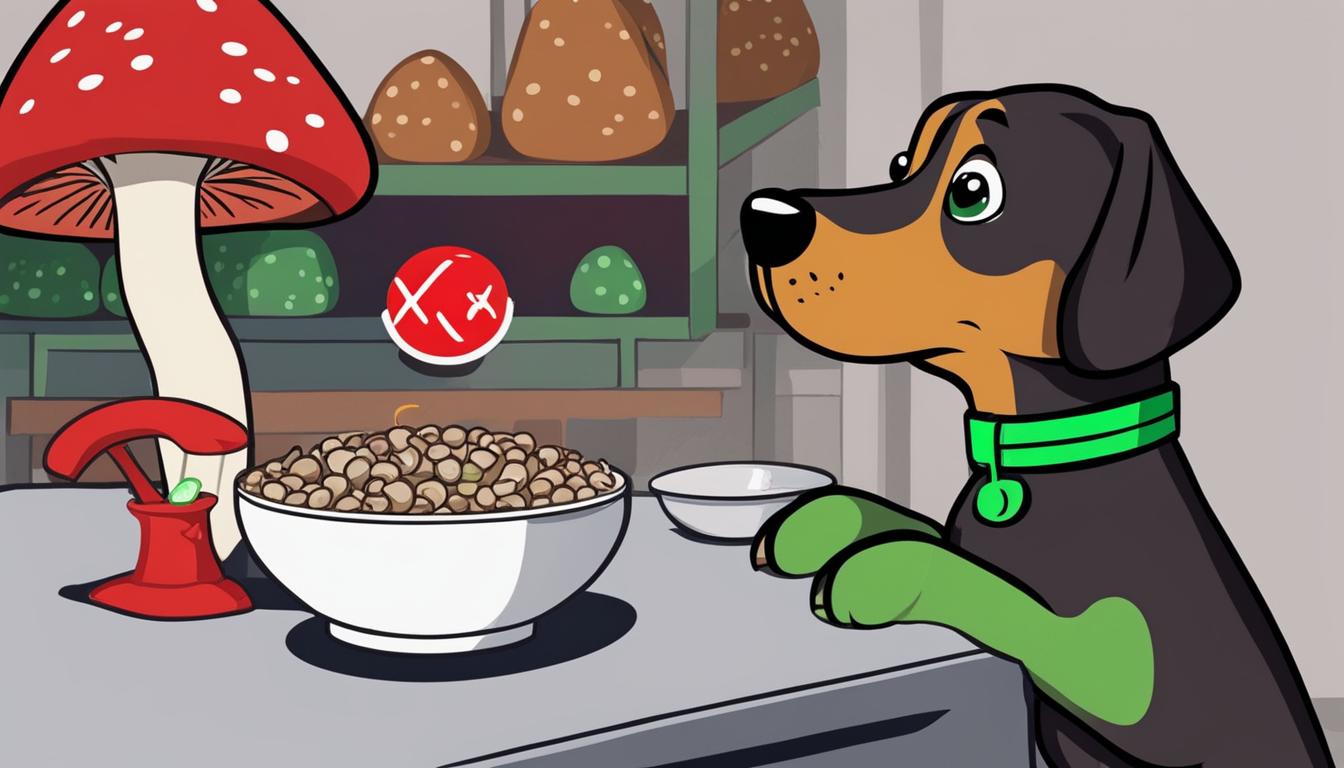Mushrooms are a fascinating and diverse food group that humans have enjoyed for centuries. But when it comes to our furry friends, can dogs safely indulge in these earthy delights? The answer is a bit complicated. While some mushrooms are safe for dogs to eat and can even offer nutritional and health benefits, others can be toxic and pose serious risks to our canine companions.
As responsible dog owners, it’s important for us to be able to identify the safe and toxic varieties of mushrooms, ensuring our dogs stay healthy and happy. In this article, we’ll explore the world of mushrooms and their relationship with our four-legged friends. We’ll uncover the risks of wild mushrooms, discuss the symptoms of mushroom poisoning in dogs, and outline the steps to take if you suspect your dog has ingested a toxic mushroom. So let’s dive in and learn more about the fascinating world of mushrooms and their impact on our beloved dogs.
Key Takeaways:
- Dogs can safely eat certain mushrooms, but it’s crucial to know which ones are safe and which ones are toxic.
- Wild mushrooms pose a significant risk to dogs, and it’s best to treat all wild mushrooms as potentially toxic.
- Symptoms of mushroom poisoning in dogs can include vomiting, diarrhea, weakness, and abdominal pain.
- If you suspect your dog has ingested a toxic mushroom, seek immediate veterinary care.
- Store-bought mushrooms can be safe for dogs, but be cautious of added ingredients and seasonings.
Can Dogs Eat Wild Mushrooms?
When it comes to wild mushrooms, caution is crucial. While some varieties are safe for dogs, many can be toxic and pose a serious risk to their health. Dogs have difficulty distinguishing between toxic and non-toxic mushrooms, and they may be attracted to the smell or texture of certain toxic species. As a responsible dog owner, it is important to treat all wild mushrooms as potentially toxic and take immediate action if your dog ingests one.
Table:
| Mushroom Species | Toxicity Level | Effects on Dogs |
|---|---|---|
| Amanita phalloides | Highly Toxic | Can cause liver failure and death |
| Galerina marginata | Highly Toxic | Can cause liver damage, seizures, and death |
| Amanita muscaria | Moderately Toxic | Can cause neurological symptoms, vomiting, and diarrhea |
| Gyromitra spp. | Moderately Toxic | Can cause gastrointestinal upset, seizures, and death |
| Inocybe spp. | Mildly Toxic | Can cause gastrointestinal symptoms and lethargy |
| Clitocybe dealbata | Mildly Toxic | Can cause vomiting, diarrhea, and abdominal pain |
Immediate veterinary attention should be sought if you suspect your dog has ingested a wild mushroom. The veterinarian will be able to determine the appropriate course of action based on the specific type of mushroom and the symptoms displayed by your dog. Remember, it’s always better to be safe than sorry, and early intervention can greatly increase your dog’s chances of survival.
Symptoms of Mushroom Poisoning in Dogs
Mushroom poisoning in dogs can have various symptoms depending on the type of mushroom ingested. It is important for dog owners to be aware of these symptoms to recognize when their furry friend may have been exposed to toxic mushrooms. Several signs of mushroom toxicity in dogs include:
- Vomiting
- Diarrhea
- Drooling
- Weakness
- Ataxia (difficulty walking)
- Lethargy
- Jaundice
- Abdominal pain
If you notice any of these symptoms in your dog and suspect mushroom poisoning, it is crucial to seek immediate veterinary care. Prompt medical attention can help prevent further complications and increase the chances of a positive outcome.
“If you notice any of these symptoms in your dog and suspect mushroom poisoning, it is crucial to seek immediate veterinary care.”
Remember that not all toxic mushrooms cause the same symptoms, and some may affect specific organs, such as the gastrointestinal system, liver, kidneys, or nervous system. Therefore, it is essential to be vigilant and stay alert to any unusual behavior or physical changes in your dog that may indicate mushroom poisoning.
In the next section, we will explore the various treatment options available for mushroom poisoning in dogs and emphasize the importance of seeking professional veterinary care in such cases.
Table: Symptoms of Mushroom Poisoning in Dogs
| Symptoms | Description |
|---|---|
| Vomiting | Expelling the contents of the stomach through the mouth. |
| Diarrhea | Frequent loose or watery stools. |
| Drooling | Excessive saliva production, often accompanied by lip licking and foaming. |
| Weakness | Lack of strength and energy, leading to reduced mobility. |
| Ataxia (difficulty walking) | Uncoordinated movements, stumbling, or a clumsy gait. |
| Lethargy | Extreme tiredness and lack of interest in activities. |
| Jaundice | Yellowing of the skin, gums, and eyes, indicating liver dysfunction. |
| Abdominal pain | Discomfort or distress in the area between the chest and pelvis. |
Treating Mushroom Poisoning in Dogs
When it comes to treating mushroom poisoning in dogs, prompt veterinary care is essential. The specific treatment will depend on factors such as the type of mushroom ingested, the symptoms displayed, and the timing of ingestion. If possible, it is recommended to bring a sample of the mushroom to the veterinarian for identification purposes. This will help the veterinarian determine the appropriate course of action.
In some cases, inducing vomiting may be necessary to remove any remaining mushrooms from the dog’s system. Additionally, drugs may be administered to counteract the toxic effects of the mushroom. Supportive care is also crucial, as it helps manage the symptoms and provides the dog with the best chance of recovery. Close monitoring of the dog’s condition will be required throughout the treatment process.
Table: Common Treatment Options for Mushroom Poisoning in Dogs
| Treatment Options | Description |
|---|---|
| Inducing Vomiting | Used to remove any remaining mushrooms from the dog’s system. |
| Toxin Counteracting Drugs | Administered to neutralize the toxic effects of the mushroom. |
| Supportive Care | Includes managing symptoms and providing necessary medical attention. |
| Monitoring | Close observation of the dog’s condition to ensure proper recovery. |
If you suspect that your dog has ingested a toxic mushroom, it is crucial to seek immediate veterinary care. Timely treatment can significantly improve your dog’s chances of survival and minimize the potential long-term effects of mushroom poisoning.
Remember, prevention is always better than cure! It is important to keep a watchful eye on your dog, especially during outdoor activities. Removing all mushrooms from your yard and being cautious during walks in wooded areas can help prevent mushroom poisoning. Stay informed about the different types of mushrooms that are toxic to dogs and consult with a veterinarian if you have any concerns or questions.

By being proactive and taking necessary precautions, you can ensure the safety and well-being of your beloved canine companion.
Can Dogs Eat Store-Bought Mushrooms?
While it’s generally safe for dogs to consume store-bought mushrooms, there are some risks to be aware of. The main concern lies in how the mushrooms are prepared and seasoned. Oils, butter, seasonings, and even ingredients like garlic and onions can be harmful to dogs. It’s crucial to ensure that mushrooms are served in a plain, unseasoned form to avoid any potential health issues.
It’s important to note that not all dogs may tolerate mushrooms well, even if they are prepared without harmful ingredients. Some dogs may experience digestive upset or allergies to mushrooms. If you’re introducing mushrooms to your dog’s diet for the first time, it’s recommended to start with a small amount and monitor their reaction. If any adverse symptoms occur, discontinue feeding mushrooms to your dog.
In general, it’s safer to avoid feeding dishes that contain mushrooms to dogs. Opt for alternative dog-friendly rewards such as carrot sticks or slices of apple as a healthier and safer option. By prioritizing your dog’s well-being and being cautious about their diet, you can ensure that they stay happy and healthy.
The Risks of Feeding Mushrooms to Dogs
“Feeding mushrooms to dogs can carry certain risks, especially when it comes to the way they are prepared. Seasonings, oils, and ingredients like garlic and onions can be harmful to dogs and should be avoided when serving mushrooms. It’s essential to prioritize your dog’s safety and well-being by providing them with plain, unseasoned mushrooms or opting for alternative rewards.”
| Mushroom Risk | Description |
|---|---|
| Allergy | Some dogs may be allergic to mushrooms, leading to symptoms such as vomiting, diarrhea, or skin irritation. |
| Chemicals and Seasonings | Commercially sold mushrooms may contain chemicals or seasonings that are harmful to dogs. Always check the label and avoid mushrooms with added ingredients. |
| Digestive Upset | Feeding mushrooms to dogs can sometimes cause digestive issues such as upset stomach, gas, or diarrhea. |
| Preparation | Mushrooms should be thoroughly cooked when serving them to dogs, as raw mushrooms may be more difficult for dogs to digest and can potentially contain harmful bacteria. |

The Nutritional and Medicinal Benefits of Mushrooms for Dogs
Mushrooms have long been valued for their nutritional and medicinal properties, and dogs can also benefit from incorporating mushrooms into their diet. When properly prepared, mushrooms can provide a range of essential nutrients, including minerals, vitamins, healthy fats, proteins, digestive enzymes, antioxidants, and prebiotics.
One of the key nutritional benefits of mushrooms is their high fiber content, which can support a healthy digestive system in dogs. Fiber helps regulate bowel movements and can aid in preventing constipation or diarrhea. Additionally, mushrooms contain B vitamins, such as riboflavin and niacin, which are important for energy production and cell function. These vitamins also play a role in maintaining a healthy coat and skin in dogs.
Medicinal mushrooms, such as turkey tail, lion’s mane, and cordyceps, have gained popularity in the canine wellness community. These mushrooms are rich in bioactive compounds that have been extensively researched for their immune-modulating and disease-fighting properties. They have shown potential in supporting overall immune health, reducing inflammation, and even inhibiting the growth of certain types of cancer cells.
Mushrooms in Dog Food and Treats
Many commercial dog food brands now include mushrooms as an ingredient in their recipes. Mushroom extracts or powders are often used to supplement the nutritional profile of the food and provide additional health benefits. It is important to look for dog food that uses safe and high-quality mushrooms sourced from reputable suppliers.
In addition to dog food, there are also mushroom-based treats available for dogs. These treats are typically made with mushroom extracts or powders and can be a convenient way to incorporate mushrooms into your dog’s diet. However, it is always important to read the ingredient list carefully and choose treats that are free from any harmful additives or preservatives.
Mushroom Supplements for Dogs
If you want to provide your dog with the specific benefits of medicinal mushrooms, mushroom supplements may be a good option. These supplements are usually available in the form of capsules or powders that can be added to your dog’s food. However, it is crucial to consult with your veterinarian before starting your dog on any new supplements to ensure they are safe and appropriate for your dog’s individual needs.
In conclusion, mushrooms can offer valuable nutritional and medicinal benefits for dogs. Incorporating mushrooms into your dog’s diet, whether through specially formulated dog food, treats, or supplements, may provide an additional boost to their overall health and well-being. However, it is important to ensure that any mushrooms used are safe for canine consumption and to consult with a veterinarian for guidance on appropriate dosage and usage.
| Mushroom | Nutritional Benefits | Medicinal Properties |
|---|---|---|
| Shiitake | Excellent source of B vitamins, iron, and fiber | Boosts immune system, supports cardiovascular health |
| Maitake | Rich in antioxidants and beta-glucans | Helps regulate blood sugar levels, supports immune function |
| Reishi | Contains polysaccharides and triterpenes | Supports liver function, reduces inflammation |
| Turkey Tail | Source of polysaccharopeptide (PSP) and polysaccharide-K (PSK) | Boosts immune system, potential anti-cancer properties |
Note: While mushrooms can offer health benefits for dogs, it is essential to remember that every dog is unique. Some dogs may have allergies or sensitivities to certain types of mushrooms. It is always recommended to introduce new foods gradually and monitor your dog for any adverse reactions. If you have any concerns or questions, consult with your veterinarian.

Preventing Mushroom Toxicity in Dogs
If you want to keep your furry friend safe from mushroom poisoning, it’s essential to take preventative measures. By being aware of the risks and taking proactive steps, you can significantly reduce the chances of your dog ingesting toxic mushrooms. Here are some key tips to help you ensure mushroom safety for your dog:
Keep your yard mushroom-free
- Regularly inspect your yard for any mushroom growth.
- If you spot any mushrooms, remove them immediately, including the root system to prevent regrowth.
- Consult with a mushroom expert if you have difficulty identifying or eliminating mushrooms.
Supervise outdoor activities
- Keep a close eye on your dog during walks or outdoor playtime.
- Prevent your dog from sniffing or eating any mushrooms they come across.
- Consider using a leash or a muzzle, especially if your dog has a tendency to explore and ingest unknown substances.
Education and training
- Learn to identify toxic mushrooms and their characteristics.
- Attend mushroom identification workshops or consult with experts to enhance your knowledge.
- Teach your dog the “leave it” command to discourage them from approaching mushrooms.
Remember, prevention is key when it comes to keeping your dog safe from mushroom toxicity. By implementing these measures and staying vigilant, you can protect your furry companion and ensure their well-being.
Conclusion
In conclusion, when it comes to dogs and mushrooms, caution is key. While some mushrooms are safe for dogs to eat, it is important to be aware of the potential risks and toxicity associated with certain varieties.
Wild mushrooms pose a significant danger to dogs, as they can be difficult to distinguish from safe ones. It is best to treat all wild mushrooms as potentially toxic and seek immediate veterinary care if you suspect your dog has ingested one.
Store-bought mushrooms can be safe for dogs, but it is crucial to consider how they are prepared and seasoned. Ingredients like garlic and onions can be harmful to dogs, so it is generally safer to avoid feeding dishes with mushrooms to our furry friends.
While properly cooked mushrooms can provide nutritional and health benefits to dogs, it is always better to consult with a veterinarian for guidance. It is essential to prioritize the safety and well-being of our canine companions when it comes to their diet and overall health.
FAQ
Can dogs eat mushrooms?
The answer to whether dogs can eat mushrooms depends on the type. While some mushrooms are safe for dogs, others can be toxic and even fatal. It is important to identify safe and toxic varieties of mushrooms to keep your furry friend healthy and happy.
Are wild mushrooms safe for dogs?
No, wild mushrooms are generally not safe for dogs. Dogs have difficulty distinguishing between toxic and non-toxic mushrooms, and they may be attracted to the smell or texture of certain toxic varieties. It is recommended to treat all wild mushrooms as potentially toxic and seek immediate veterinary attention if your dog ingests a wild mushroom.
What are the symptoms of mushroom poisoning in dogs?
The symptoms of mushroom poisoning in dogs can vary depending on the species ingested. Common symptoms include vomiting, diarrhea, drooling, weakness, difficulty walking, lethargy, jaundice, and abdominal pain. If you suspect your dog has ingested a toxic mushroom, seek immediate veterinary care.
How is mushroom poisoning in dogs treated?
The treatment for mushroom poisoning in dogs depends on the type of mushroom ingested, symptoms, and timing. Options may include inducing vomiting, administering counteractive drugs, providing supportive care, and monitoring. Prompt veterinary care is crucial for the best chance of recovery.
Can dogs eat store-bought mushrooms?
Generally, store-bought mushrooms are safe for consumption by dogs. However, it is important to consider how they are prepared and seasoned. Ingredients like oils, butter, seasonings, garlic, and onions can be harmful to dogs. It is safer to avoid feeding mushroom dishes to dogs and opt for alternative rewards.
What are the nutritional and health benefits of mushrooms for dogs?
Mushrooms, when properly prepared, can provide minerals, vitamins, healthy fats, proteins, digestive enzymes, antioxidants, and prebiotics to dogs. They can support immune health, liver function, gut health, and may have anti-cancer properties. Certain medicinal mushrooms have been extensively researched for their immune-modulating and disease-fighting properties.
How can I prevent mushroom poisoning in my dog?
The best way to prevent mushroom poisoning is to remove all mushrooms from your yard and closely supervise your dog during outdoor activities. Treat all wild mushrooms as potentially toxic unless you are an expert forager. Regularly check your yard for new mushroom growth and consult an expert if needed.
Can dogs safely eat mushrooms?
While some mushrooms are safe for dogs, it is essential to be knowledgeable about the potential risks and toxicity of certain varieties. Wild mushrooms pose a significant danger, so it is recommended to treat all wild mushrooms as potentially toxic. Consult with a veterinarian for guidance on feeding mushrooms to dogs.





